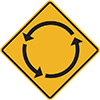Warning Signs alert you to possible hazards ahead.
See all Pass the Permit Test Topics
Related Pages
Road Signs | Pavement Markings | Warning Signs | Pass the Permit Test | Permit Practice Tests
Warning Signs alert you in advance that there is a possible hazard ahead - here are a few examples:
Reduction of Lanes
There will be less lanes ahead - the Right Lane Ends and vehicles in the right lane have to merge left. Drivers in the left lane should allow other drivers to merge smoothly.
Winding Road
There will be several curves in the road ahead. Slow down and drive carefully. Do not pass other vehicles.
Note: Source of all the signs and definitions below is the 2017 Florida Drivers Handbook
There will be fewer lanes ahead. Right lane ends and traffic must merge left. Drivers in the left lane should allow others to merge smoothly.
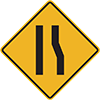
The highway ahead is divided by a median or physical barrier. Keep to the right.
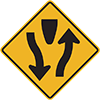
The divided highway on which you are traveling ends 350 to 500 feet ahead. You will then be on a roadway with two-way traffic. Keep to the right.
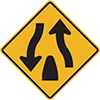
You are coming to a point where another traffic lane joins the one you are on. Watch for other traffic and be ready to yield the right-of-way when necessary.
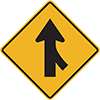
The paved surface ahead changes to a gravel or earth road.
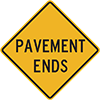
Do not enter if your vehicle is taller than the height listed on the sign.
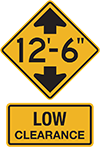
In wet weather, drive slowly. Do not speed up or brake quickly. Make turns at a very slow speed.
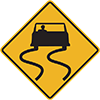
There is a low place in the road. Go slowly and be ready to stop and turn around if the dip is filled with water.
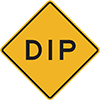
A bike-way crosses the roadway ahead. Watch for bicyclists.
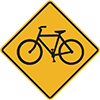
Watch for people crossing the street. Slow down or stop to yield for pedestrians.
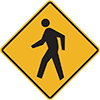
The animal pictured on the sign is common in this area; watch for animals crossing the road particularly during twilight and night-time hours.
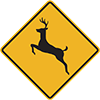
Watch for trucks entering or crossing the highway.
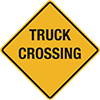
The bridge is wide enough to accommodate two lanes of traffic, but with very little clearance. Stay in your lane.
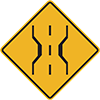
The bridge is wide enough for only one vehicle at a time. Make sure the bridge is clear of oncoming traffic before you cross.
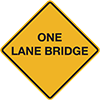
The ground on the side of the road is soft. Don't leave the pavement except in an emergency.
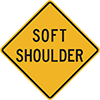
The road will curve to the right. Slow your speed and do not pass other vehicles.
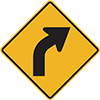
The road will curve to the right, then to the left. Slow your speed and do not pass other vehicles.
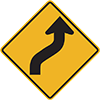
There are several curves ahead. Drive slowly and carefully and do not pass other vehicles.
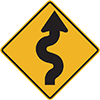
A road crosses the main highway ahead. Look to the left and right for other traffic.
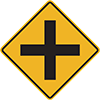
Another road enters the highway from the direction shown. Watch for traffic from that direction.

The road will make a sharp turn to the right. Slow your speed and do not pass other vehicles.
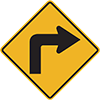
The road goes downhill ahead. Slow down and be ready to shift to lower gear to control speed.
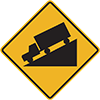
The highest safe speed you should travel around the curve ahead is the one posted. Advisory speed signs may be used with any warning sign.
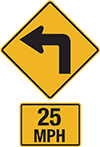
Advance notice to upcoming speed limit change.
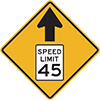
Yield sign ahead. Slow down and be prepared to stop at yield sign or adjust speed to traffic.
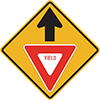
Alerts you to traffic signals at the intersection ahead. Slow down; poor visibility is likely.
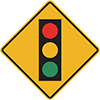
Slow down and be ready to stop at the stop sign.
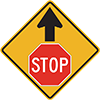
The one-way street or roadway is about to change to two-way traffic; there will be oncoming traffic.

Provides advance notice of a roundabout. Prepare to slow down and possibly yield.
